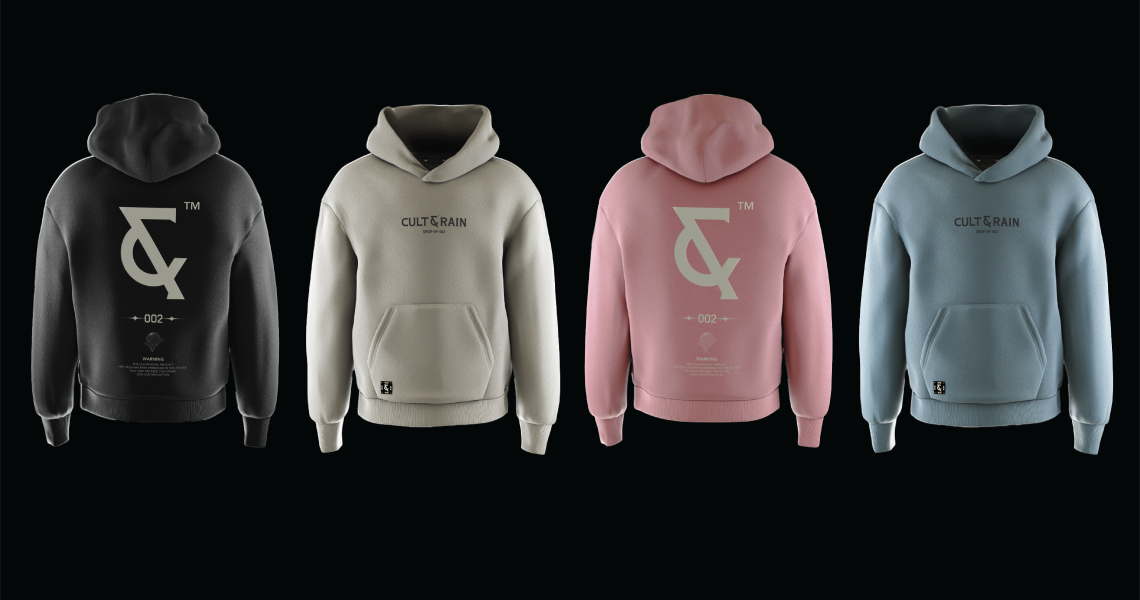Web3 brands have a more native understanding of what it takes to build consumer loyalty using technology and a connected product experience. One-year-old web3 fashion brand Cult & Rain is doing this by combining an AR NFT product and an NFC tagged hoodie integrating AI design. Together, they facilitate authentication, resale, community communication and marketing.
George Yang, formerly creative director at contemporary fashion brand Cerruti Paris, launched Cult & Rain in April 2022. Initially, the brand came out with a sneaker collection, a metaverse shopping experience called Cultr World and an immersive IRL event. E-commerce followed, in November.
Now, Cult & Rain is launching its second ready-to-wear product, a connected NFC-chipped hoodie granting exclusive access to the brand’s world through an app. The scannable NFC chip is the brand’s port of call for all product authentication, resale and communications with the customer. Each hoodie also comes with an AR hoodie NFT, through a partnership with AR fashion platform DressX. As the physical hoodie only goes to production when the item is bought and takes eight weeks to arrive, buyers gain access to the NFT first. This setup builds brand loyalty, as customers get an end-to-end experience before even receiving their physical item, according to the company.
Yang said the brand can upload anything to the app, and will go directly to the customer. The app, developed by LTD.inc, an NFT purchase platform, is launching a peer-to-peer resale component in the third quarter, and Cult & Rain is the first brand partner.
“What’s great about this tech is that you can launch exclusive content,” said Yang. “The NFC chip can have pre-loaded exclusive content like behind-the-scenes videos, brand updates, even direct-to-consumer videos of me thanking [customers] for purchasing the hoodie.”
Andy Griffiths, CMO of Cult & Rain, said, “This is marketing through the product, as opposed to the channel, effectively replacing emails. Once you have mass adoption of NFC chips, people won’t need to receive an email; you’ll just get notifications through your products.”
The hoodie with the app access and integrated NFC chip also serves as access into the brand’s discounts and token-gated events.
“In the future, if you’re wearing a hoodie and we launch a pop-up or we have an event, we can immediately upload the promotional content for it into this digital hoodie chip,” said Yang. “The hoodie can also become a token-gated access pass: If you have the black hoodie, you will have more access into a certain room at an event, while a pink hoodie will only give you access to a certain room.” It can also serve as an access pass for limited discounts. “We can choose to reward all of our hoodie holders with 25% off for 24 hours inside our pop-up store.”
2020 research by e-commerce fraud prevention company Forter found that 45% of existing loyalty program accounts were inactive, with customers not tracking or redeeming their points.
“Loyalty programs are a valuable tool for building customer loyalty, but brands need to carefully consider their implementation and execution to ensure that they’re effective and worth the investment,” said Tara Fung, CEO and founder of Co:Create, a platform that helps companies launch web3 loyalty programs. The company is currently working with Atari, a gaming company that holds the most land in the Sandbox gaming platform. “Even if a brand has a loyalty program in place, poor execution can lead to low participation and poor results. For example, if rewards are too difficult to redeem or the program is not promoted effectively, customers may not see the value in participating.”
Web3 technology, like NFC connected products, can be a solution for existing loyalty program issues. Big brands like Starbucks are already launching web3-enabled loyalty programs for their customers.
The idea behind connected products using web3 technologies is that customers can access everything in one place and know that their access is limited and special. For brands, this benefits their bottom line as the customer journey and continued membership can all be accessed through the app data. “By tokenizing rewards, brands can empower customers to take ownership of their loyalty while also leveraging composable technology to boost lifetime value and reduce customer acquisition costs,” said Fung.
In fact, the interoperability behind web3 could allow brands like Cult & Rain, which are using web3 technologies like the NFC chip and rewards, to take it one step further by offering collaborative rewards with other brands. “Interoperability enables brands to collaborate and share rewards with each other, creating a network effect that can increase customer engagement and loyalty,” said Fung.




